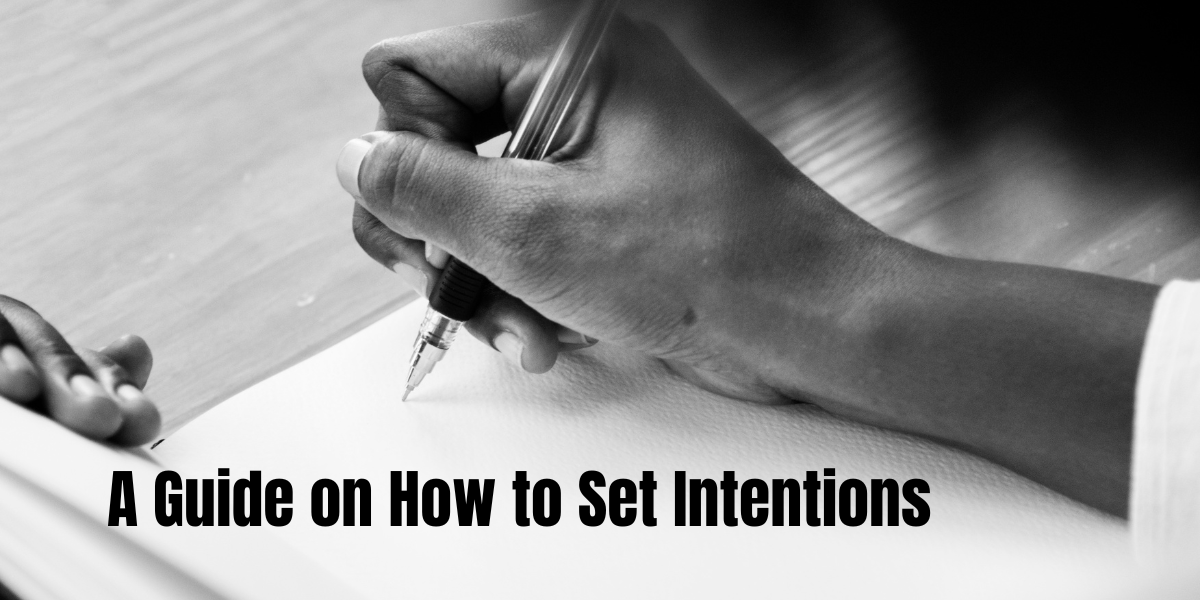Setting intentions is essential for personal growth and achievement in our current world, which constantly demands attention. This article guides you to fixing meaningful preferences, a process that develops clarity in our choices and helps manifest our goals. We will discuss how to create specific, positive, actionable intentions and ways to ensure they align with your core values. Prepare to discover a powerful tool that drives you toward a life filled with purpose and fulfillment.
Tips on Setting Intentions
Setting intentions can be a strong way to help guide your actions and behaviors toward reaching your goals. Here are a few tips:
Be Clear and Specific
Get clear and specific about what you want to do. With vague goals, it’s hard to know where to go. For example, instead of saying, “I want to do better in school,” be more specific by saying, “I will study for my biology class an extra hour every day.”
Keep It Upbeat
How you talk about your goals should be upbeat. Instead of saying, “I won’t put things off,” say, “I’ll start my work as soon as I’m given it.”
Make It Possible to Do
Your goal should be something you can do something about. It’s not just a dream or a goal; it tells you what to do daily.
Align with Your Beliefs
Ensure your plans align with your goals and beliefs. If you care about your health and fitness, you might aim to work out daily or eat well. It helps you clarify your desires based on your thoughts and values. The intentions you set guide your actions, allowing you to act consistently with your beliefs. By setting intentions, you prioritize your beliefs in your daily life. Finally, through setting intentions and acting upon them, you effectively manifest your beliefs in your everyday life.
Write It Down
Write your intentions somewhere you’ll see them often, like in a book or on a Post-it note in your bathroom mirror. This will help you remember what you want to do.
Check Back Often
Your goals are flexible. It’s important to look at them often and make changes as needed. You might find that an intention you set no longer helps you, and that’s fine. You can always choose a new goal.
How to Set Intentions
Setting intentions means clarifying what you want to be, do, or give and ensuring your thoughts and actions align. Here’s how you set intentions:
Find Out What’s Most Important
First, ask yourself what’s most important to you. What ideals, qualities, or experiences do you want more of? This could be something like kindness, imagination, health, connection, learning, peace, or success. This could also be about your home, school, or work life. Dig deep to find out what you want.
Imagine The Result
Once you know what you want, take time to picture it. Imagine what it would look, feel, and sound like to reach this goal. This gives you a clear picture and a good feeling, both of which help you reach your goal.
Identify What Matters Most
State your goal in a way that is positive and clear. Practice gratitude and have a holistic approach. Instead of saying, “I don’t want to be stressed,” you could say, “I plan to live my daily life with peace and calm.” Clear, positive goals and deep breaths make it easier to stay on task and feel grounded.
Visualize The Outcome
What you want to do can help you remember it. It also gives you something to look back on when you need inspiration or more information. Self-reflection is important. Look into the big picture. Keep it somewhere you can see it to help you remember where you’re going.
Make a Plan of Action
A goal with a plan of action is likely to stay the same. Figure out what steps you can take to make your goal come true. Break up big goals into smaller, more doable steps.
Mindfulness
Mindfulness lets you become more aware of your feelings, and actions and how they fit with what you want to do. Meditation, yoga, or writing in a book daily can help you become more aware throughout the day.
Being Able to Adjust
Your goals may also change as your life changes, and you grow personally and professionally. Reviewing and changing your goals can keep them relevant and aligned with your current ideals and life.
Be Compassionate
Be patient and kind because things might not change right away. Don’t be too hard on yourself or your success. Realize that mistakes are a normal part of the process and use them as chances to learn and grow instead of reasons to give up. Setting intentions for self-care and self-kindness reflects self-compassion. Setting intentions requires mindfulness, which boosts awareness of your needs and those of others, fostering compassion. Moreover, the self-reflection involved in intention-setting enhances understanding of your journey, encouraging a more profound sense of compassion for your struggles and growth.
List of Examples of Intentions
Health and Wellness
- I intend to drink eight glasses of water each day.
- I intend to incorporate 30 minutes of exercise into my daily routine.
- I intend to prioritize my mental health by meditating for 15 minutes daily.
Academic and Professional
- I intend to spend an additional hour each day studying for my exams.
- I intend to complete my work assignments ahead of time to avoid last-minute stress.
- I intend to improve my public speaking skills by practicing at least twice a week.
Personal Growth and Relationships
- I intend to express gratitude daily, acknowledging at least one thing I’m grateful for.
- I intend to dedicate quality time to my family without distractions.
- I intend to read a new book every month to broaden my perspective.
Mindset and Attitude
- I intend to practice positive self-talk.
- I intend to remain open-minded in conversations with others.
- I intend to let go of things that I cannot control.
Lifestyle and Habits
- I intend to reduce my screen time by one hour each day.
- I intend to go to bed by 10 p.m. each night to ensure I get enough sleep.
- I intend to practice sustainable living by reducing, reusing, and recycling.
Frequently Asked Questions
Why Should We Set Intentions?
Setting intentions helps you figure out what to do and how to act. It’s like planning where you want to go in your head. It can help you stay focused, work more efficiently, and reach your goals more often because it lets you direct your mind and energy toward what you want to happen. It also helps you be more aware of your thoughts and deeds, which helps you align them with your values and goals. Setting intentions and goals can greatly affect how well you do in your personal, academic, and work life.
What Does Best Intentions Mean?
Best intentions mean the most honest and good motives that drive a person’s actions. These goals are mostly based on moral values like honesty, kindness, and fairness. Having the best intentions means you want good things to happen and don’t want to hurt anyone, even if the results aren’t what you expected. The idea shows that people are naturally good and want to do what’s right or good for others. But it’s important to remember that good goals alone aren’t enough. They must be combined with actions that are well thought out because even the best goals can sometimes be ruined by actions that could be better thought out. The best intentions should be based on careful thought, empathy, and deep knowledge of the possible outcomes. Furthermore, this can serve as a reminder that people’s intentions, not just deeds, should be considered when judging them.
When Should I Set Intentions?
Intentions can be set anytime, but it works best in particular situations. It’s a great time to make plans when something new starts, like a new day, week, month, or year. Goal setting at the beginning of a new project, job, or educational course can also be helpful. These changes are like blank boards where you can show what you want to do. Also, times when you’re thinking about yourself or growing as a person, like after meditating, yoga class, writing in a book, or going to a workshop, can be good times to clarify your goals. It’s also important to think about your plans again and change them as your life changes. Lastly, setting goals during hard times is a good idea because it can give you direction and drive. Remember that setting intentions is to give your mind a place to focus so that your actions align with your goals and beliefs.
Wrap up
To become an expert at setting intentions, you must have a clear head, positivity, concrete plans, a commitment to your principles, and patience. This method acts as a beacon, illuminating the path you should take daily to achieve what you want from life. Always remember that the power of setting intentions transforms and that the journey itself is just as important as the destination. This method can help you sharpen your attention, take the necessary steps, and feel more accomplished. Start today, make plans, and create the life you want.





